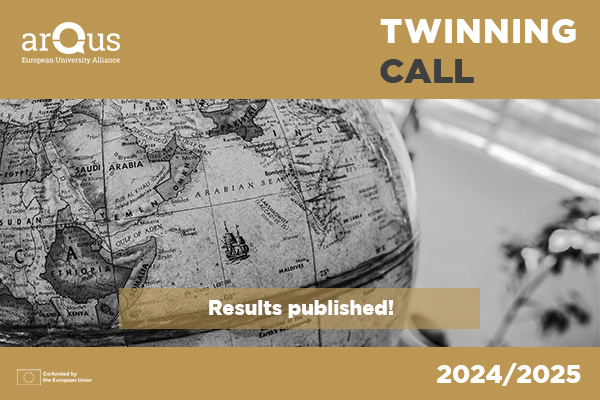Arqus Twinning 2.0: Discover the Selected Projects
 The working group Arqus on the Move is glad to announce that the call for Arqus Twinning 2.0 ended with 12 projects approved, involving all the universities of the Alliance.
The working group Arqus on the Move is glad to announce that the call for Arqus Twinning 2.0 ended with 12 projects approved, involving all the universities of the Alliance.
Twinning 2.0 consists of an international mobility programme for two groups from two Arqus universities, consisting of one lecturer and three to five students, reciprocally visiting each other’s partner institution to carry out a joint programme and share learning experiences.
This initiative aims to strengthen the subject-related collaboration of staff and students and create possibilities to carry out joint learning and teaching activities through piloting short-term mobility schemes.
Projects will be carried out through the academic year 2024-2025 enabling more than 110 students and 24 lecturers to benefit from the mobility programme. The first group mobilities will take place at the beginning of November 2024.
This is the list of the 12 projects selected for funding thanks to the Innovation Fund and additional resources from partners:
- Climate Justice: Introducing and discussing domestic, European and international climate law jurisdiction
- Medical European Heritage: an education and cultural perspective between Padua and Vilnius.
- Traditional rural landscapes and innovative local development. Which role for touristic and food and wine activities?
- Energy Network for Advanced Conversion Technologies (ENACT)
- Climate transition pathways: Granada and Vilnius experience
- Interculturality and diversity of practices: AI in language teaching for future teachers
- New Forms of Authorship in Contemporary Latin American Literature
- Bridging Sustainability and Digital Innovation: A Twinning Program
- “Re-Europeanising Europe: an analysis of the EU’s contribution to democratic values and how to strengthen European identity in the face of division”
- Multilevel Challenges for the EU and the Contestation of the Global International Order
- The European Identity through Cultural and Linguistic Migrations in Spain and Poland
- Using AI to apply empirical methods in English linguistics
Full information on the results is available here.